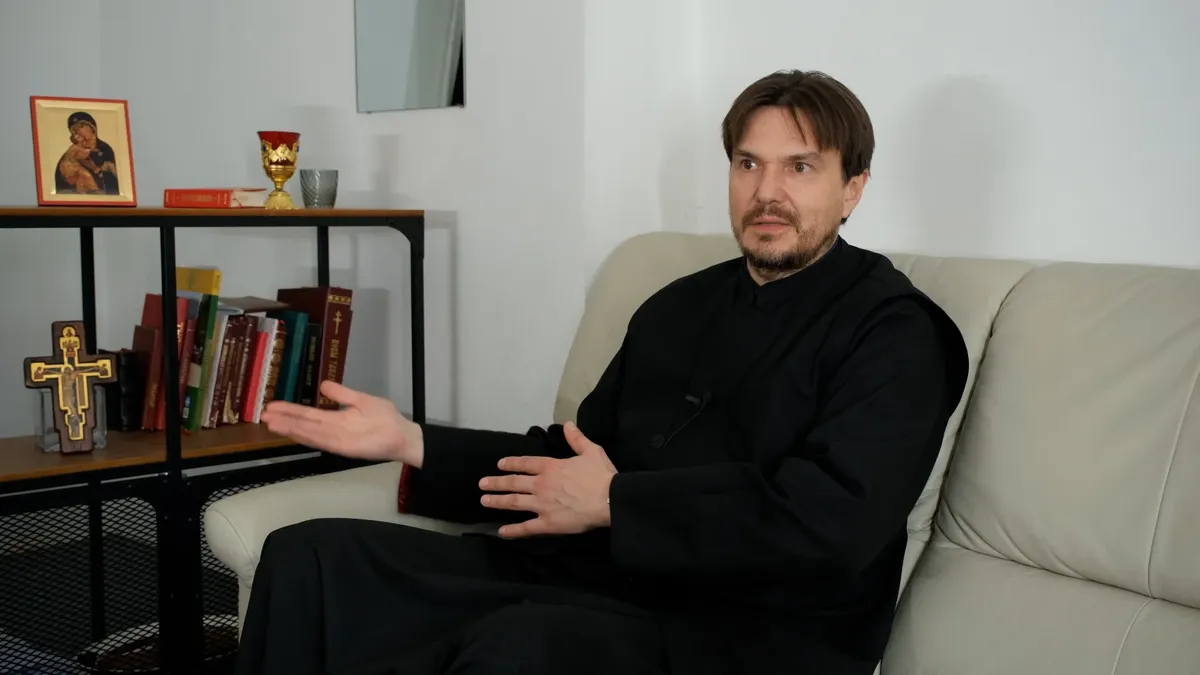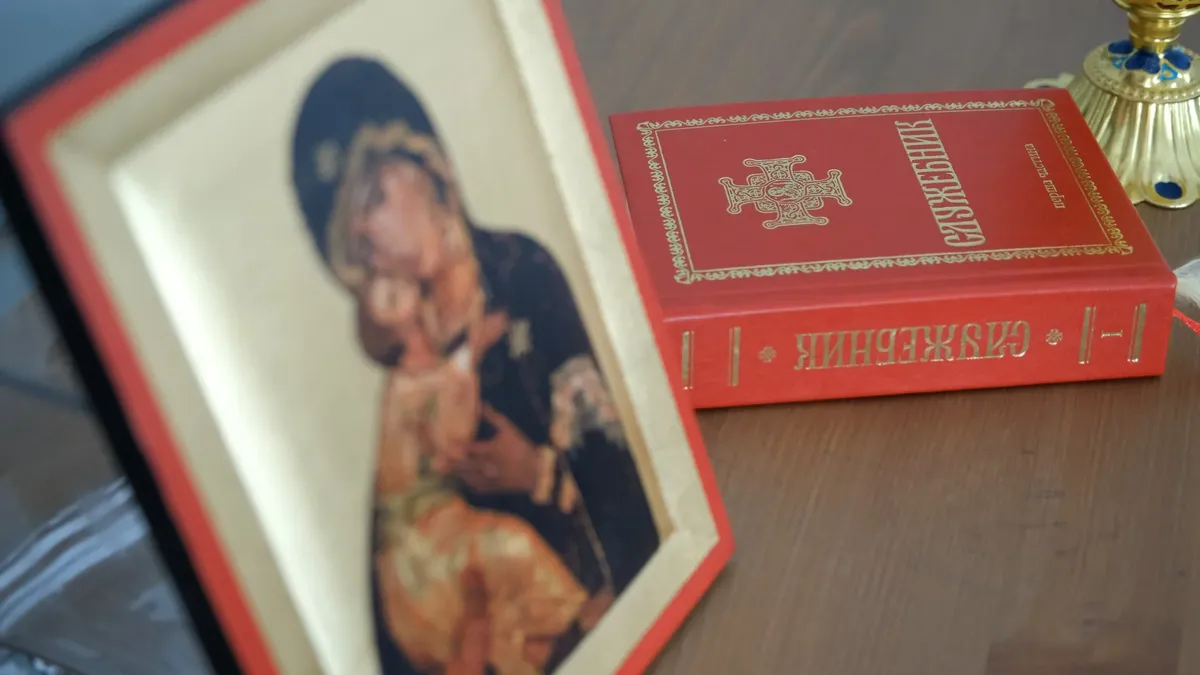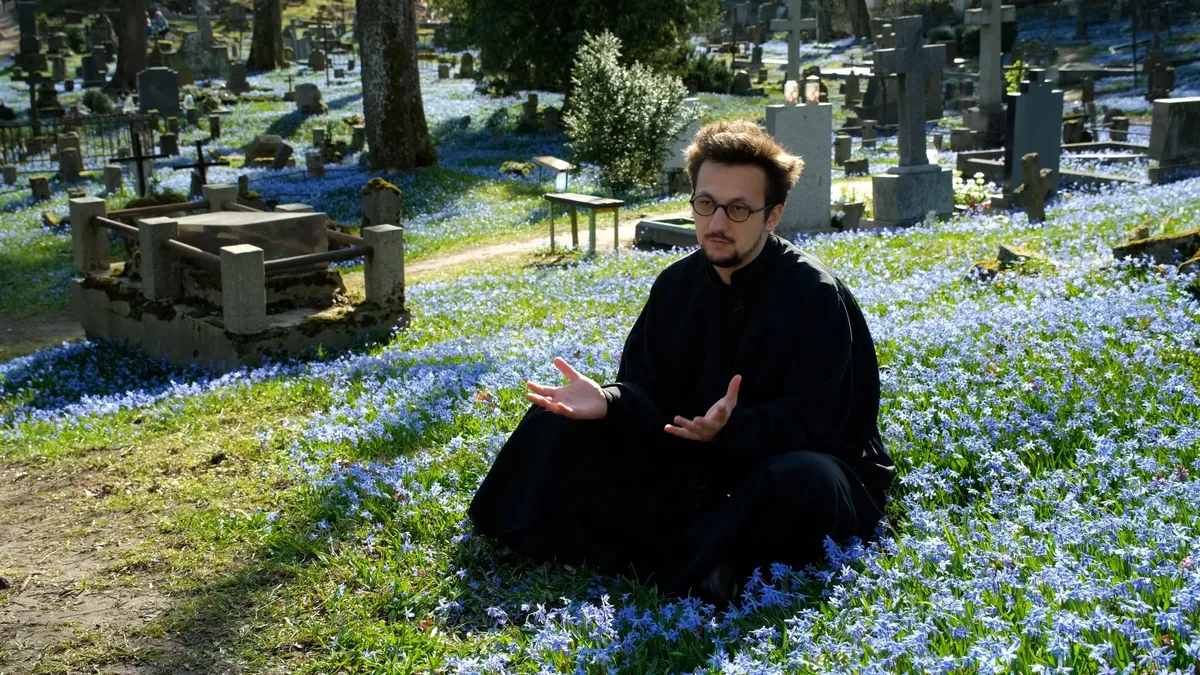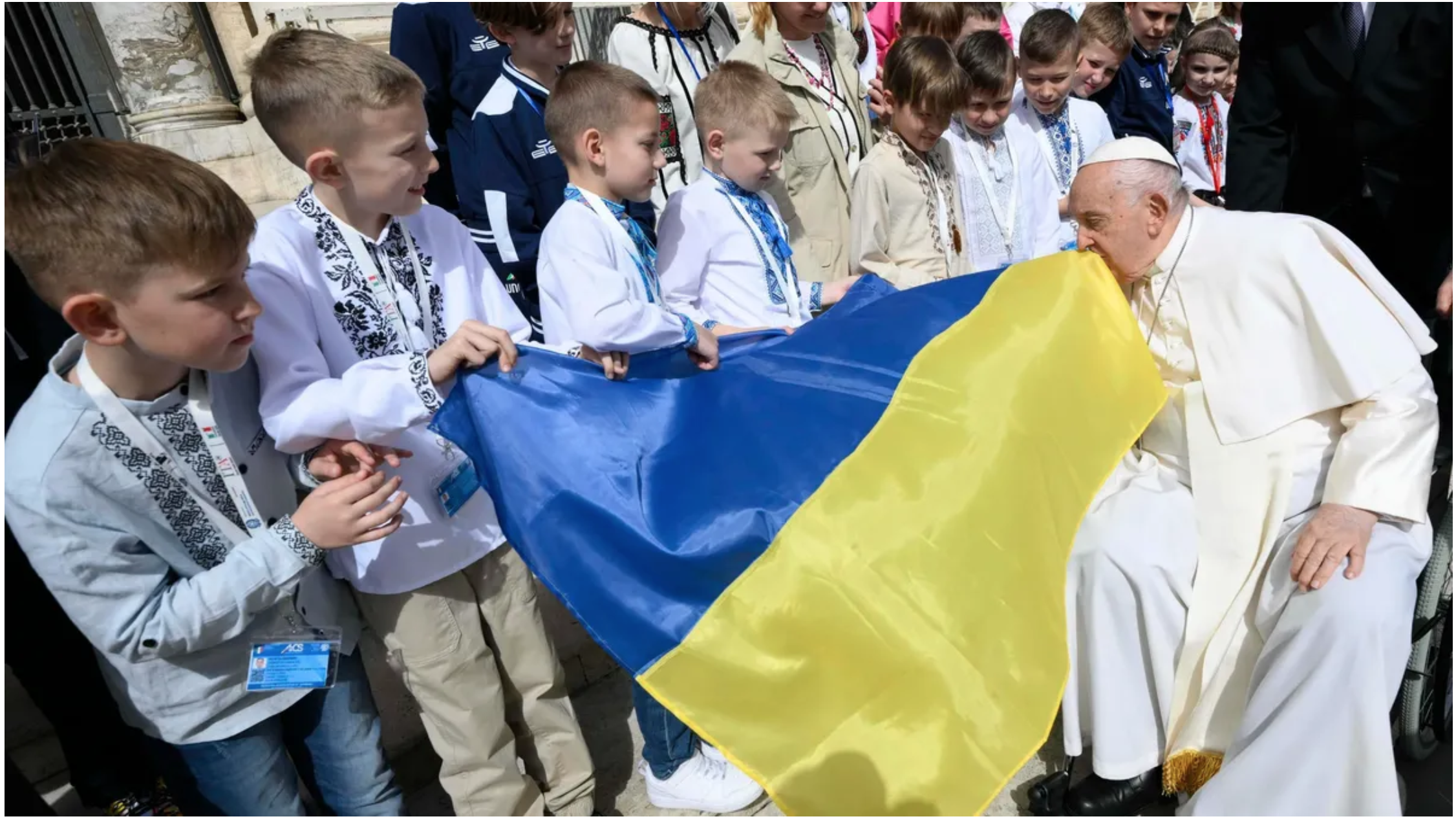How the Russian orthodox church's pro-war stance birthed an alternative church in Lithuania
alternative church in Lithuania
Initially, the attempt by the Russian Orthodox Church (ROC) to ‘reprimand’ five priests who took an antiwar stance in Lithuania resulted in their expulsion and defrocking. However, their voices grew louder and stronger, eventually leading to the formation of an alternative Orthodox church. The scandal within one of society’s most conservative institutions is explored by ‘Novaya Gazeta. Baltiс’.
“Who can muzzle me?” Why conflict arose within the Orthodox Church
One of the five priests who disagreed with the official, de facto pro-war stance of the Russian Orthodox Church (ROC) is Vladimir Selyavko. He poses a rhetorical question: “Who can muzzle me? Speaking out against war is my civil right, and there is no church canon that prohibits me from speaking. From the very first days of Lithuania’s independence restoration, I became its citizen, happy to defend my right to freedom of speech.”
Father Vladimir has studied and continues to study theology all his life. He literally grew up in the church and from a young age wanted to become a priest. He considers his uncle’s monastic tonsure a defining event of his childhood.
However, after 27 years of service in the church, the Orthodox priest realized that he no longer saw himself within the structure of the ROC: “There were several reasons for this, all related to the war in Ukraine: the open support of the so-called ‘LDPR’ by Patriarch Kirill, the silence of Lithuanian bishops, and the multifaceted attempt to explain that we supposedly do not interfere in politics.”

– In the early weeks of the conflict, tension arose within Lithuania’s secular society, which couldn’t understand why the Orthodox hierarchy remained silent, – Vladimir Selyavko recalls. “When sticking to the old tactics became impossible, in March 2022, a clergy assembly was convened, where Metropolitan of Vilnius and Lithuania Innocent presented his vision. From my perspective, it was an attempt to have one’s cake and eat it too.
The most resolute priests expressed their disagreement with the local diocese and the ROC. One of the fathers, Vitalis Dauparas, decided to leave the service. Another, Gintaras Sungaila, was willing to continue but refused to commemorate Patriarch Kirill.
– The ROC was displeased that we openly criticized the patriarch, – emphasizes Vladimir Selyavko, who didn’t refuse to commemorate Kirill but prayed for him as someone who had fallen into serious fallacies. A similar position was held by two other priests – the chancellor of the diocese Vitalyus Motskus and the cleric from Klaipeda Georgy Ananyev.
The interviewees of “Novaya Gazeta. Baltic” referred to this as a conflict between two groups of priests, which gradually escalated in 2022 with the start of full-scale invasion in Ukraine.
– The Orthodox Church in Lithuania accumulated people who associated themselves with Russia, – notes Belarusian priest Alexander Kukhta, who has been living in Vilnius since 2022. – It’s a small and rather closed group with views different from the majority of Lithuanian society. At this time, a group of five priests came out with a clear and specific message: we are against the war and stand for the main Christian narrative, which is non-violence. At that moment, the difference between Lithuanian and pro-Russian priests became too noticeable.
He believes that if a priest cannot actualize the gospel message by commenting on current events, then he hasn’t understood Christianity.
– How the Russian Church in Lithuania reacts to the war in Ukraine is shameful. Not to mention Russia, where the ROC has become a tool of ideological struggle, – Alexander Kukhta expresses his outrage.
According to another Belarusian priest, Alexander Shramko (who has also been living in Lithuania for the past few years), for a long time, the Baltic country did not see the face of true Orthodoxy. The Church oriented itself toward the Russian-speaking part of the population and constantly looked toward Moscow. It wasn’t as noticeable before, as pro-European hierarchs occupied decisive positions. Metropolitan of Vilnius and Lithuania Innocent seemed to be among them, and for a long time, it seemed that he was following the same line. But the war in Ukraine exposed the ideological confrontation, and the structure of the Moscow Patriarchate appeared in its true light.

Defrocking is akin to a life sentence
They attempted to reason with the dissenting group. Initially, they subtly, then openly urged them not to cause trouble, essentially urging them to submit and compromise their conscience. However, soon the conflict took a new turn. Vitalis Dauparas and Gintaras Sungaila were summoned to the diocese, where they were informed that repentance was expected, and since it didn’t occur, their request for dismissal was granted.
They were also threatened with harsher measures. The day before, the chancellor Vitalyus Motskus was sent into retirement. Society erupted in outrage: the actions of the Orthodox Church were perceived as censorship, retaliation for their stance, and acquiescence to military aggression.
“The day before, I told the fathers that they would be expelled, and as soon as it happened, I would leave with them in solidarity,” says Vladimir Selyavko. “And that’s what happened. I submitted my resignation on the same day, April 15, but at first, they didn’t sign anything, they even tried to persuade me to change my stance.
On May 10, decrees were issued dismissing all the ‘erring’ priests from their positions and banning them from performing religious duties. They were warned that if they didn’t stop speaking out about the war, they would be defrocked. This warning was presented as baseless accusations of ‘creating a schism’.
“When it became clear that we wouldn’t back down and would stick to our position, we were summoned to a church court. This was done in violation of all procedural canons: we weren’t charged, weren’t given time to reflect, and our immediate superior served as the presiding judge,” Father Vladimir enumerates the violations. “None of us, of course, attended this process, because otherwise, it would have been disrespectful to ourselves.
The verdict, priests compare, resembled a decision reminiscent of the NKVD ‘troika.’
Essentially, they were banned from serving for the rest of their days, or, in secular terms, given a life sentence.
In an instant, the five priests found themselves on the streets. It was a challenging trial for people who had been connected to the church their entire lives. Unfounded accusations were hurled at them, condemnation by parishioners, promises that ‘they would regret it.’
“I was scared for the future, but I couldn’t stay silent,” admits Vladimir Selyavko. “I had to sell my house because I could no longer afford the mortgage. Many turned away from us, including close relatives—my brother, uncle. They even tried to turn my mother against me. Thankfully, it didn’t work out. I received support from my wife, children, son-in-law, and fellow church members.
The expulsion of the five, however, seemed insufficient to the ROC. The diocese attempted to coax the priests through open appeals, directly mentioning the names of the ‘erring.’ For a while, appeals to them hung on bulletin boards in churches, and they were referred to as schismatics.
“The Russian church propaganda uses precisely this term, but this is by no means a schism,” Alexander Kukhta strongly disagrees with such an assessment. “By schism, I understand the departure of a group of priests who decide to found a new church, which is unrecognized by anyone. But in this case, the priests were expelled for their anti-war stance.
Alexander Shramko reminds: there were no patriarchates at all before, and that suited the Christian world. “The presence of large religious institutions is a relic that should become a thing of the past. We live in a secular society, in a pluralistic world. Worldviews differ, religions should also be diverse,” he says.
Return to History: The Ecumenical Patriarchate comes to Lithuania
The five priests did not agree with the actions of the ROC. They appealed to the Ecumenical Patriarch, based in Constantinople. The Lithuanian government supported them in this matter. Over the course of a year, a commission examined the case and concluded that the Lithuanian priests had been banned for political reasons rather than canonical ones. Therefore, they are eligible for reinstatement.
This was a significant victory and a resounding slap in the face for the ROC, which, of course, disputes the legitimacy of this process and continues to accuse the five of schism.
“This manipulation prevents normal dialogue,” believes Alexander Kukhta. “Another speculation by the ROC was that Constantinople, upon coming here, would forcefully take over all the churches and drive the parishioners onto the streets. Obviously, this is not the case. The future bishop (Justinus Kiviloo – Ed.) directly refuted this. In his opinion, this would only worsen the conflict, and he does not want further escalation.
Despite resistance from the ROC and the local diocese, the establishment of an alternative Orthodox Church took place in Lithuania: it is officially established and registered as a traditional denomination. The Ecumenical Patriarch visited Vilnius, demonstrating support for the priests who were expelled for their views. An agreement was signed with the government on cooperation, and the establishment of a representation of the Constantinople Patriarchate – an exarchate – was announced.
“This is a return to legendary history – the canonical church has returned to its ancestral lands,” believes Alexander Kukhta. “The fact is that the territories of modern Lithuania, Belarus, Ukraine, partially Latvia, and Russia (Bryansk and Smolensk regions) were originally under the jurisdiction of the Constantinople Patriarchate until the Russian Orthodox Church arrived with troops. Now there is a convenient moment when many interests coincide, including the government’s desire to obtain a canonical alternative to Orthodoxy, so as not to surrender all believers of this confession to Russian propaganda.”

Alexander Shramko, however, doesn’t believe it’s right to solely appeal to history: “The world has changed significantly, and looking to the past is an ancient relic. Of course, the Patriarchate of Constantinople was forced to resort to this argument. But if this fact didn’t exist, then what? We need to consider the needs of the present time.”
The discontent of the Russian Orthodox Church is understandable. It’s rapidly losing its influence. This occurred even before the full-scale war in Ukraine. Now it’s happening in Lithuania.
“When Patriarch Kirill came, he emphasized that the ROC is not the church of the Russian state,” recounts Alexander Shramko. “It was said to have followers in different countries. But gradually, everything boiled down to the point where there’s not even a formal distancing from the ideological towers of the Kremlin. The ROC prays for the victory of Russia, which is waging war against a fellow Orthodox country. Some call the recent decrees of the Moscow Patriarchate heresy. I consider it a replacement of religion.”
In the future, according to the interviewees of “Novaya Gazeta.Baltic”, the ROC will be perceived solely as an institution of the Russian government. This could lead to the world no longer recognizing it as an Orthodox Church.
Support from other denominations
Currently, Vladimir Selyavko serves at the former Lukiskes Prison Museum in Vilnius, where he’s allowed to preach without agreements, by goodwill. A similar situation exists in other regions of Lithuania. Communities gather in Catholic, Lutheran, and Reformed churches, chapels, and social centers in Kaunas, Siauliai, Klaipeda, and Taurage.
“There aren’t many people yet. But motivated parishioners are coming to us—educated, literate, capable of distinguishing religion from ideology,” Father Vladimir emphasizes with evident enthusiasm.
He excitedly talks about plans to establish a fund that will start raising funds for the construction of a church: “We need spiritual centers around which people will gather. There’s a lot of work ahead.”
According to the pastors, before the pandemic, ROC churches in Lithuania were visited by about three thousand people regularly (some every Sunday, some once a month, some on major holidays). They were mainly Russian-speaking Lithuanians.
“Of course, the influence of the new church is currently weak,” admits Alexander Shramko. “The church relies on activists and a cloud of people who are involved in religion. It attracts new parishioners. Usually, this cloud forms around a physical place, namely the church.”
An important part of the congregation became immigrants from the new wave—Ukrainians, Belarusians, Russians. For understandable reasons, many of them fundamentally do not attend ROC services.
In the structure of the new Exarchate (the Patriarchate of Constantinople), a parish has emerged where services are conducted in Belarusian. It’s located on Bokstu Street in Vilnius. The space is rented at commercial rates from the city. The rector is Georgy Roy, and the second priest is Alexander Kukhta. The latter explains the importance of such a parish:
“No one will understand Belarusians and their traumas better than another Belarusian. The same applies to Ukraine. About 40-45 people come to the regular service. On Christmas, there were over 150. We’re considering renting a larger space.”
Father Alexander sees his mission in spreading Lithuania’s experience to Belarus in the future. He wants an alternative to the Russian Orthodox Church to appear there as well, which increasingly resembles the Kremlin’s propaganda machine. As recent events in the Baltic countries show, this is a quite plausible scenario.
Material created with the support of “Medianetwork”



















